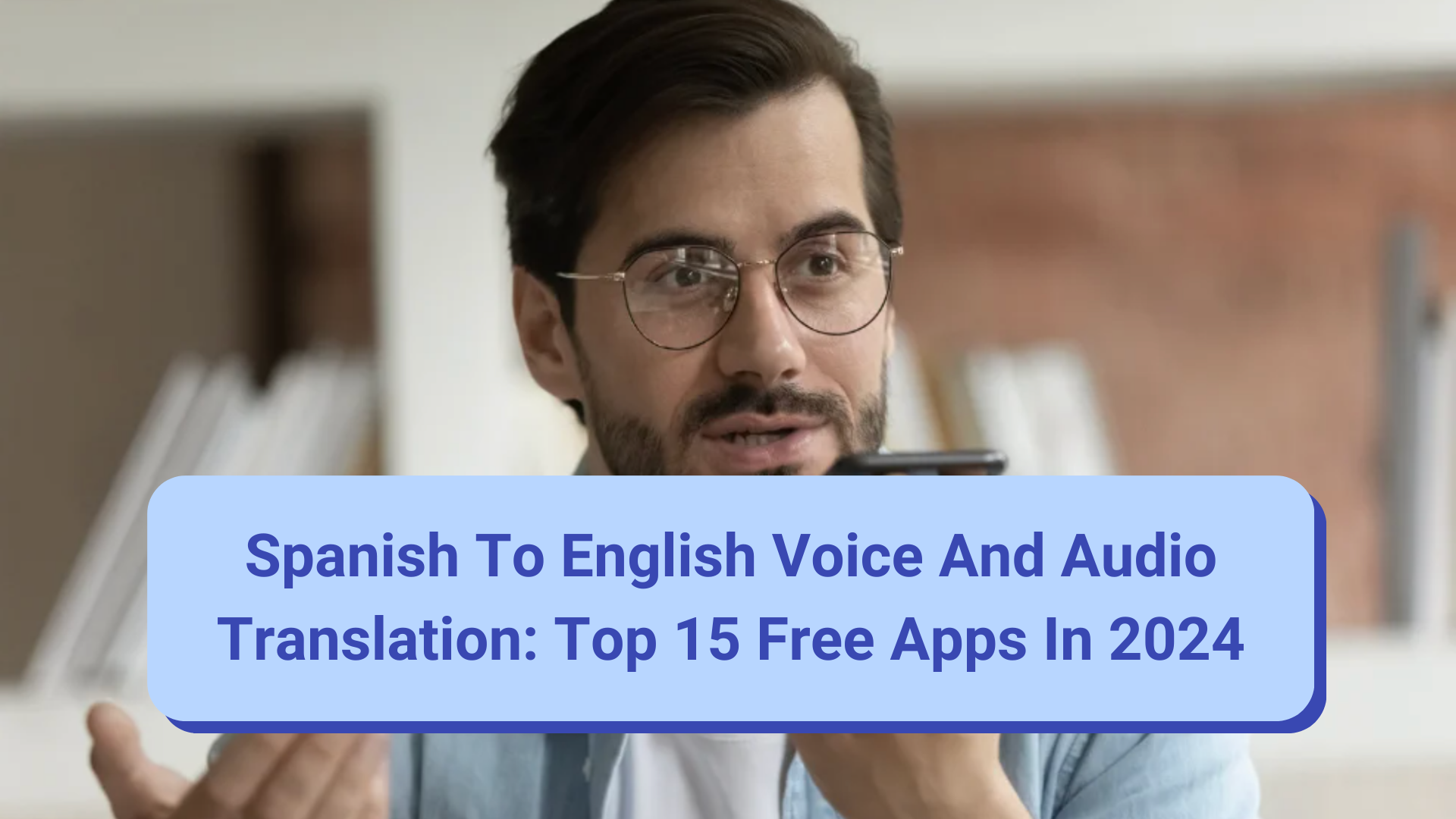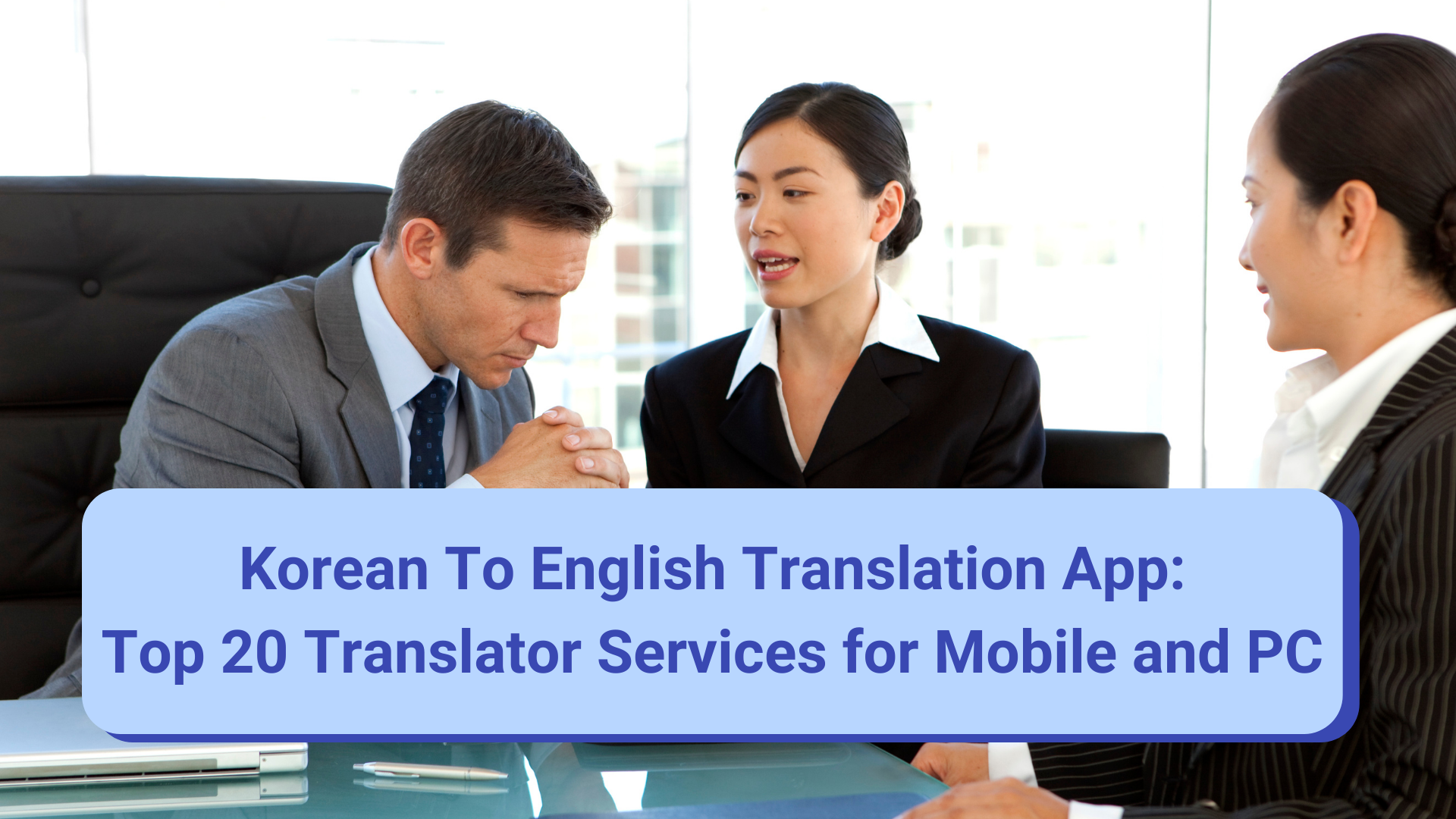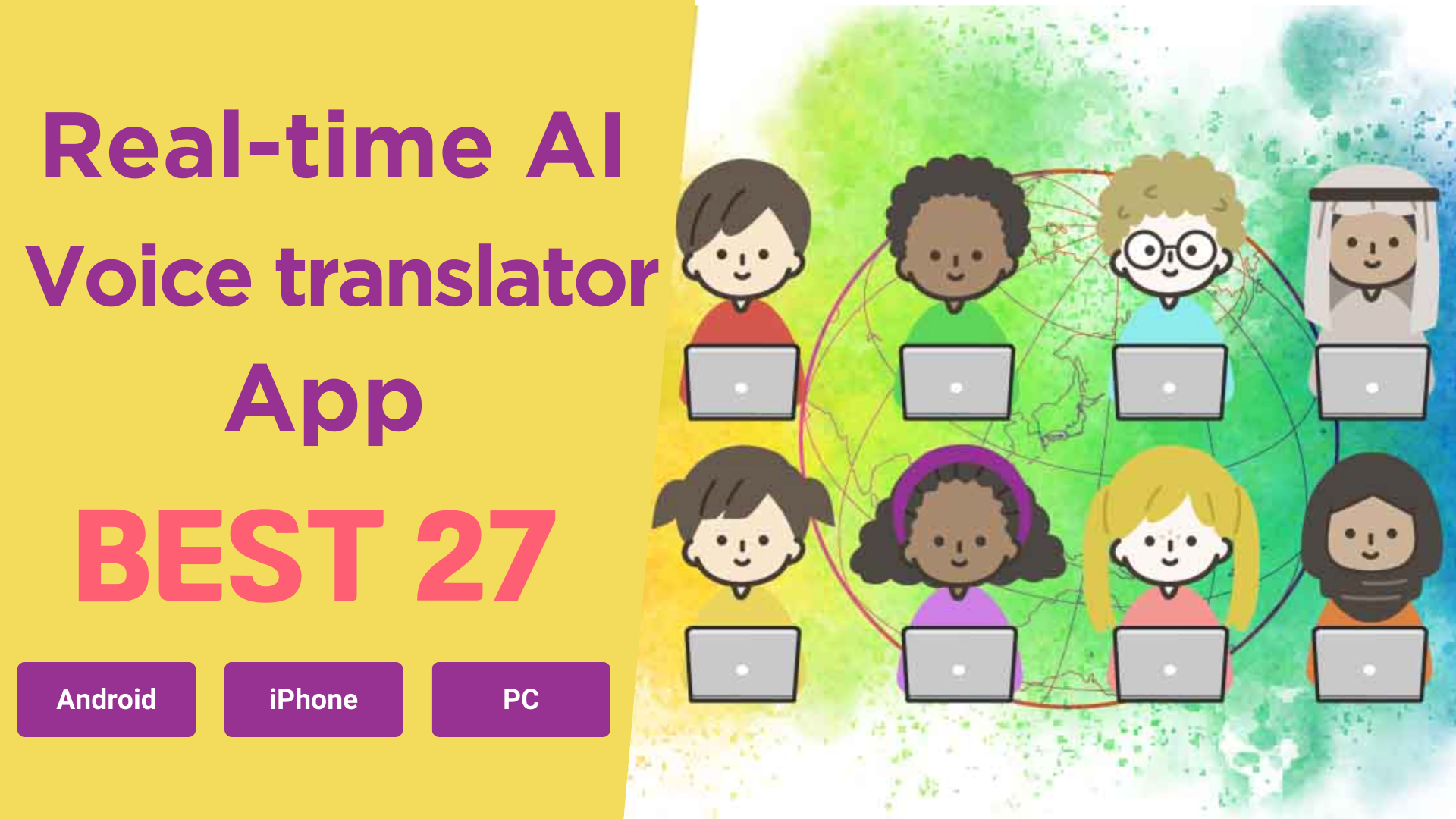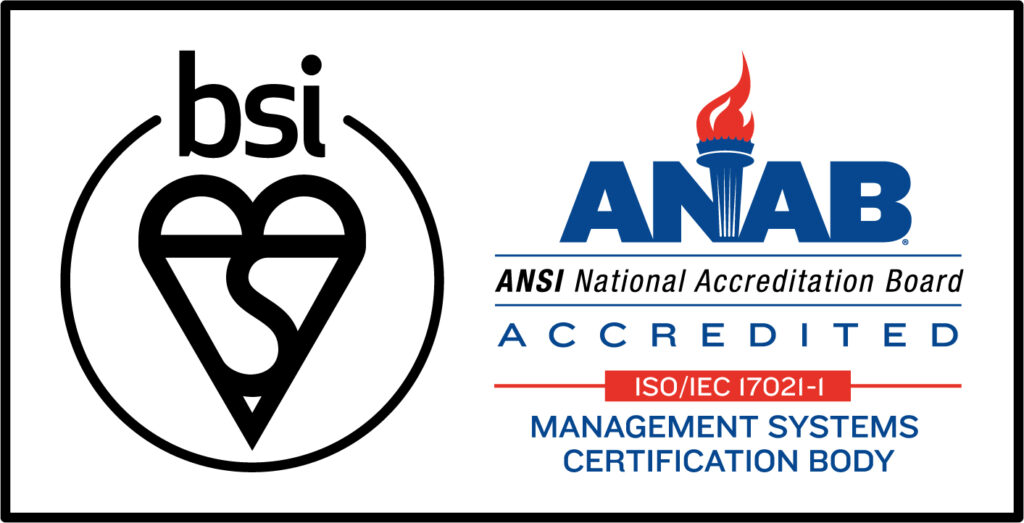AnimeJapan 2025, held in March 2025 at Tokyo Big Sight, is an annual celebration of anime that attracts fans and industry professionals from both Japan and around the world. Now in its 12th year, the event was once again divided into two sections: “Public Days” for general attendees and “Business Days” for industry professionals, featuring a wide range of content and lively business discussions.
One of the most notable trends this year was the steady increase in international visitors since the COVID-19 pandemic. However, this has also brought a major challenge: overcoming language barriers. How did Kansuka and Okada from Sony Music Solutions Inc., the company responsible for event operations, address this issue and incorporate solutions into their event management?
In this article, we explore their insights through an interview, taking a close look at how they utilized VoicePing for real-time translation and discussing the future possibilities for multilingual support at events like AnimeJapan.
You can read our interview article from AnimeJapan 2024 here.
目次
ToggleAnimeJapan 2025: A Global Celebration of Anime Draws Fans from Around the World to Tokyo Big Sight
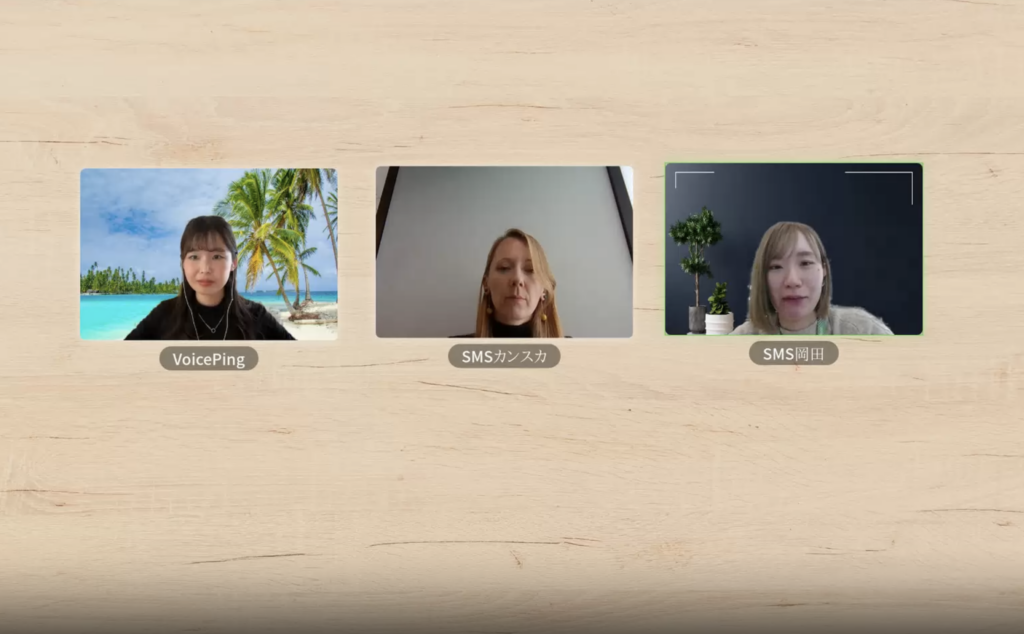
— To start, could you briefly introduce yourselves? What roles did you play at AnimeJapan 2025?
Kansuka:
I’m Kansuka from Sony Music Solutions Inc. AnimeJapan is made up of two segments: the “Public Day” for general attendees and the “Business Day” for industry professionals. I was in charge of overseeing the entire Business Day operations.
Okada:
My name is Okada from Sony Music Solutions Inc. I was also in charge of the Business Day, mainly handling coordination with speakers and support for exhibitors.
— Could you give us an overview of the AnimeJapan 2025 event?
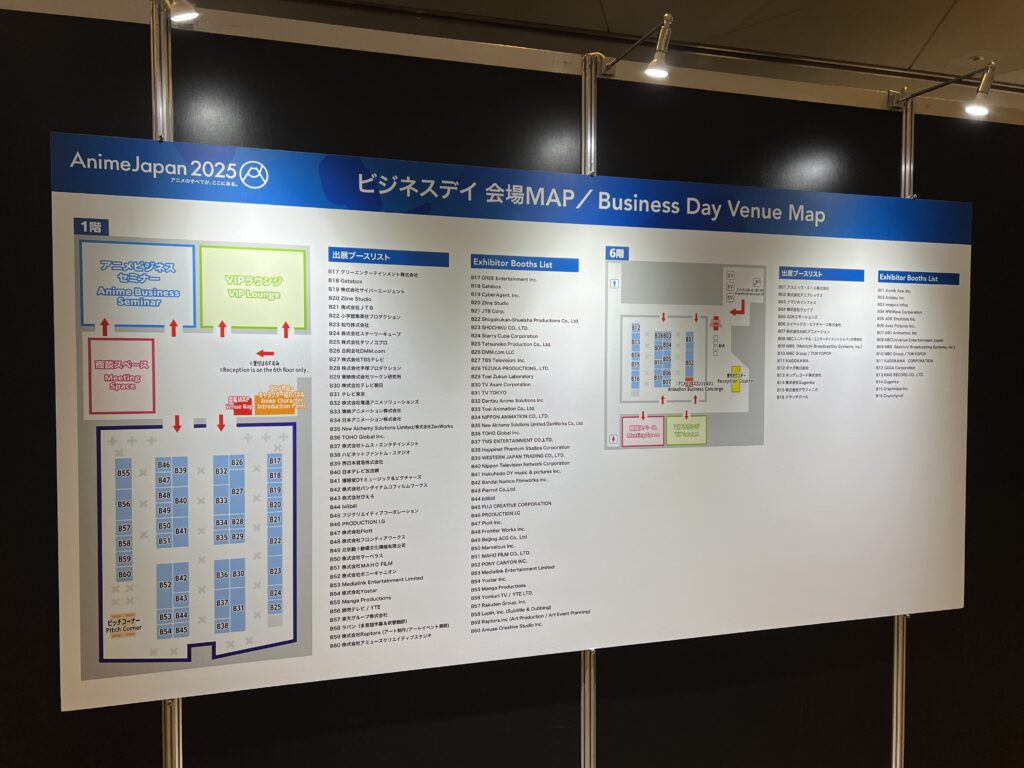
Kansuka:
AnimeJapan, now in its 12th year, is one of the largest anime events in Japan. The event was divided into two sections: “Public Days” for general attendees, and “Business Days” for industry professionals, each held over two days.
First, the “Public Days,” held on March 22 (Saturday) and 23 (Sunday), were geared towards anime fans. Many anime-related companies from all over Japan exhibited their products and services. Stage events, merchandise sales, exhibitions, and a variety of other activities were held at each booth, creating a lively atmosphere. Areas like the AJ Stage, the cosplay zone, and the food court were packed with attractions for visitors to enjoy.
On the other hand, the “Business Days,” held on March 24 (Monday) and 25 (Tuesday), were dedicated to industry professionals. Numerous anime-related companies participated, facilitating active business discussions between domestic and international firms, information exchanges about the anime business, and participation in various seminars. It served as a vital platform for business networking in the anime industry.
Rising Numbers of International Visitors — But What Challenges Lie Ahead?
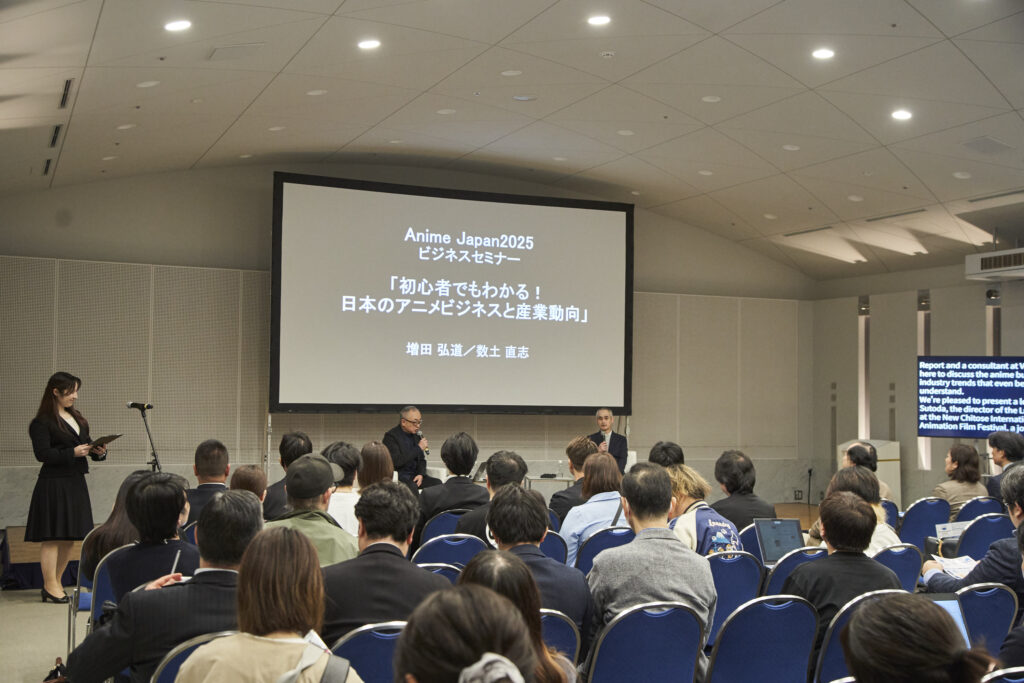
— AnimeJapan is known not only for attracting domestic fans and industry professionals, but also for drawing significant attention from fans and partner companies around the world. Have you faced any challenges in communicating with overseas participants? And if so, how did you address them?
Kansuka:
While we don’t have precise data on the number of international visitors, it’s clear that the number has grown significantly since the end of the COVID-19 pandemic. We’ve always had some level of overseas attendance, but starting last year, the increase has become especially noticeable.
In response, we’ve worked to improve the ticketing experience for international visitors. In the past, tickets were only available through Rakuten Ticket, but last year we expanded sales to Taiwan’s “KKTIX.” This year, we added South Korea’s “Melon Ticket” and the global travel booking platform “Trip.com,” enhancing multilingual and regional accessibility.
To address the language barrier, we once again implemented VoicePing this year, following its successful use at AnimeJapan 2024.
“We Want to Use VoicePing Again”—Here’s Why
Real-Time Translation at the Forefront, Backed by Trust and Proven Results
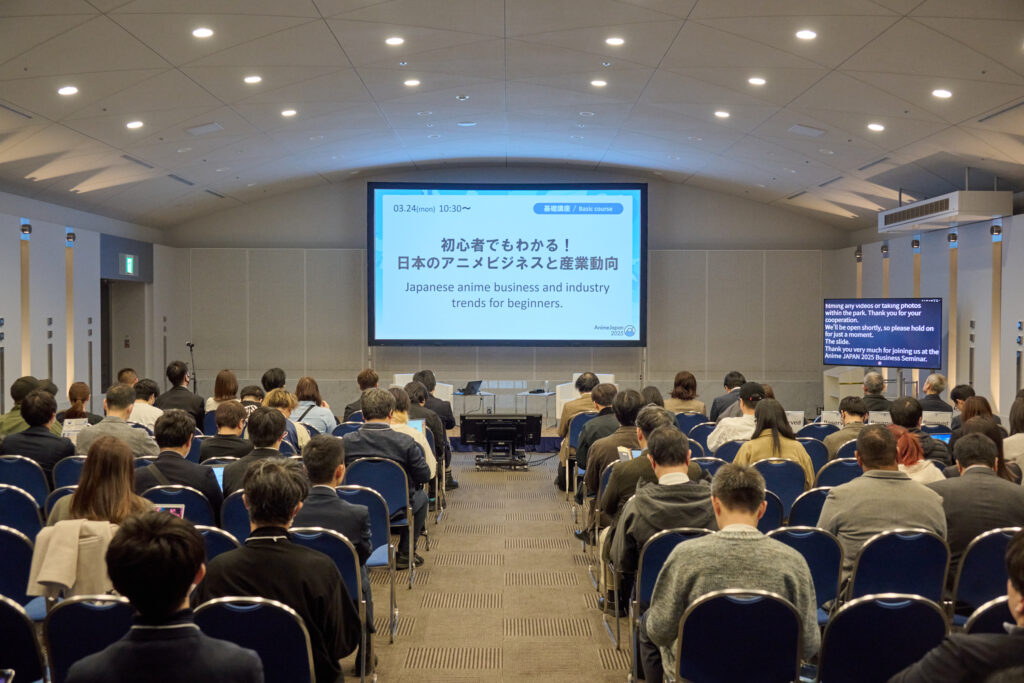
— Thank you. What made you decide to use VoicePing again this year?
Kansuka:
One of the biggest reasons is the overwhelmingly positive feedback we received when we used VoicePing last year. As I mentioned earlier, with the number of international visitors growing each year, we believe that providing strong language support remains a key priority.
In the seminars we hosted this year, most speakers gave their presentations in Japanese, as the primary audience was domestic. That said, there were still many attendees from overseas. We’ve continued to place importance on creating an inclusive environment where everyone—regardless of language—can access the information and fully enjoy the event.
Last year, the implementation went very smoothly without any major issues, and we’ve also worked with VoicePing at other events with great success. Based on that trust and experience, we felt confident in using it again this year.
You can read our interview article from AnimeJapan 2024 here.
From Character Names to Industry Jargon—VoicePing Delivers Real Understanding, Right to Your Smartphone
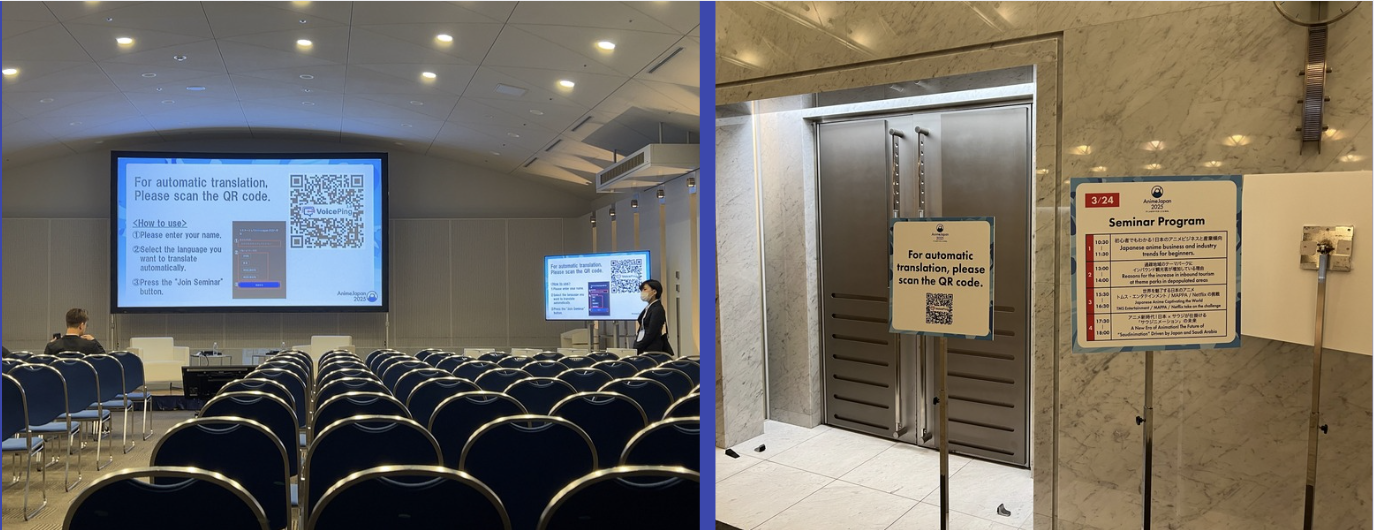
— How was VoicePing utilized at AnimeJapan 2025?
Kansuka:
During the Business Day, we hosted three to four seminar sessions per day. While all of the speakers presented in Japanese, we had attendees from all over the world.
To ensure that language didn’t become a barrier, we displayed QR codes on both the main screen and sub-monitors before each session, allowing attendees to access real-time translations directly on their smartphones. Additionally, we set up extra monitors around the venue to display the translated content clearly, making sure it was easy for everyone to follow along.
— Given the nature of the event, with frequent mentions of character names and titles, how well did VoicePing handle those kinds of specialized terms?
Okada:
Yes. We had the speakers provide their specialized terminology in advance, which we compiled into a CSV file and shared with the VoicePing team prior to the event.
They made sure that character names and titles were accurately reflected in the translation results using their proper international representations.
On the day of the event, we were able to confirm that the translated titles were displayed correctly in English.
Of course, it’s realistically difficult to cover every single title and proper noun in advance, but even so, we felt that the translation quality was very high, and we were very satisfied with the results.
Okada:
The translation speed was very fast. However, since the word order differs between Japanese and English, I felt there were some challenges with the method of “displaying an immediate English translation and updating it progressively.”
For those relying on the English translation to follow the seminar, there were moments when it may have been difficult to understand, as the English text would be continuously updated to match the flow of the Japanese speech.
Kansuka:
Let me add to that. When we used VoicePing at last year’s event, both Japanese and English text were always shown simultaneously. At the time, we shared some feedback, such as, “It would be helpful to show only the translated language,” and “Larger font sizes would improve readability.” We really appreciated that these requests were taken into account for this year’s implementation.
That said, as Okada mentioned, panel discussions tend to involve longer and more complex sentences, which naturally led to the translations being rewritten several times as the speakers continued. In many cases, once the full translation was displayed, it made perfect sense and was easy to follow. But during those intermediate updates—when a sentence was still being constructed or rewritten—it was sometimes unclear whether the text was correcting a previous translation or beginning a new one.
I’m not sure if it’s technically possible, but if translations could be shown all at once—after a sentence is completed—even with a slight delay, it might make it easier for viewers to follow the content. If that could be achieved, I believe it would offer an even smoother experience.
— Thank you for the valuable feedback. We’ll definitely use your insights to help improve the user experience moving forward.
“Simple” and “Convenient” — What Makes VoicePing Truly Valuable
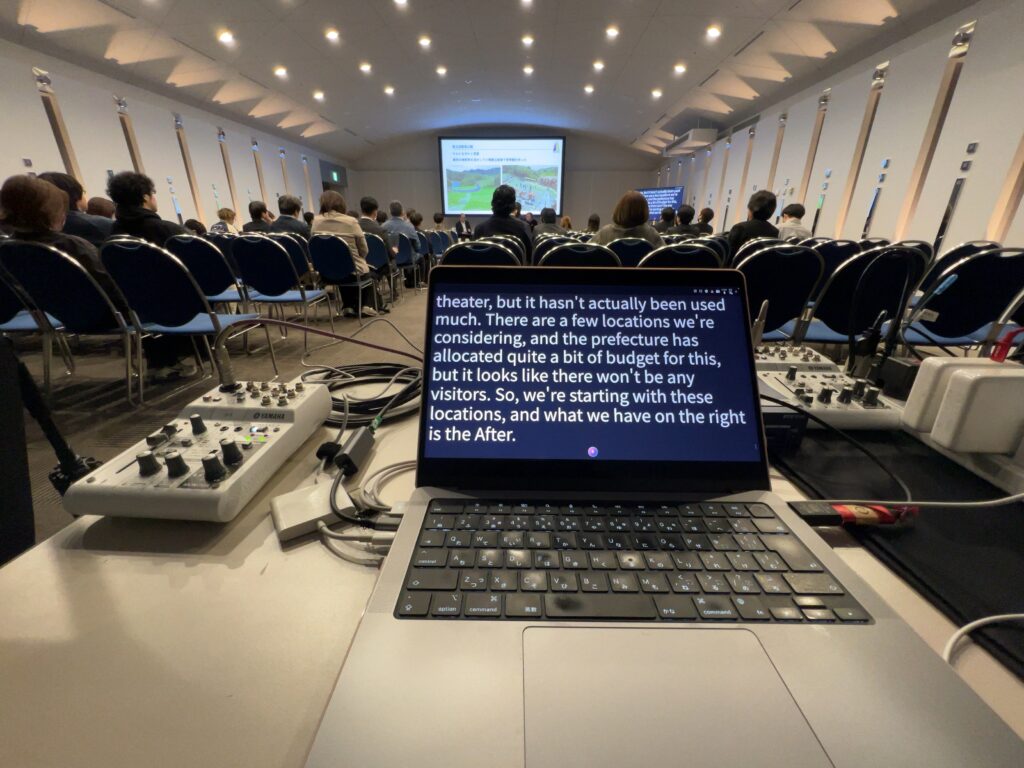
— What are your overall impressions of using VoicePing?
Okada:
Just like last year, we had on-site support from the VoicePing team, which was incredibly helpful. While we weren’t able to oversee every seminar from start to finish ourselves, everything ran very smoothly overall. Even during the prep phase, we had clear communication regarding the formats and information needed, which made the whole process easy and efficient. All in all, we had a very positive experience, and we really appreciated the support.
— Were there any areas where you thought, “This could be improved” or “It’d be great to have this feature”?
Kansuka:
As I mentioned earlier, probably the only major issue we encountered was how the translations were repeatedly updated mid-sentence.
If I had one request, it would be related to language selection. Last year, we were able to limit the available translation channels to four languages, but this year, all 45 languages were open to users.
While I understand this makes the system more accessible for a multinational audience, in an event like AnimeJapan—where there are many unique titles and character names—we want to minimize the risk of mistranslations as much as possible.
It would be great if the system allowed us to restrict available translation languages to just those for which we’ve prepared a dictionary in advance. This would reduce the chances of inaccuracies in unprepared languages and give organizers more control and peace of mind.
Okada:
We received a CSV format template from VoicePing for dictionary registration.
However, at the time we received it, we had already created our own format and had asked the seminar speakers to fill it out.
It was a bit unclear whether we should simply submit our existing format, whether we needed to re-enter the information into VoicePing’s CSV format, or whether both formats were required.
If both were necessary, it would have been helpful to receive the VoicePing format a little earlier.
— Thank you for the feedback. You’re absolutely welcome to submit your existing format, as long as it includes the necessary information—we’ll handle the rest!
Okada:
That’s great to hear. Thank you so much!
— If you had to sum up VoicePing in one sentence, what would it be?
Kansuka:
In every sense, it’s simple and convenient.
Real-Time AI Translation: A Beacon of Hope for the Future of Anime Events
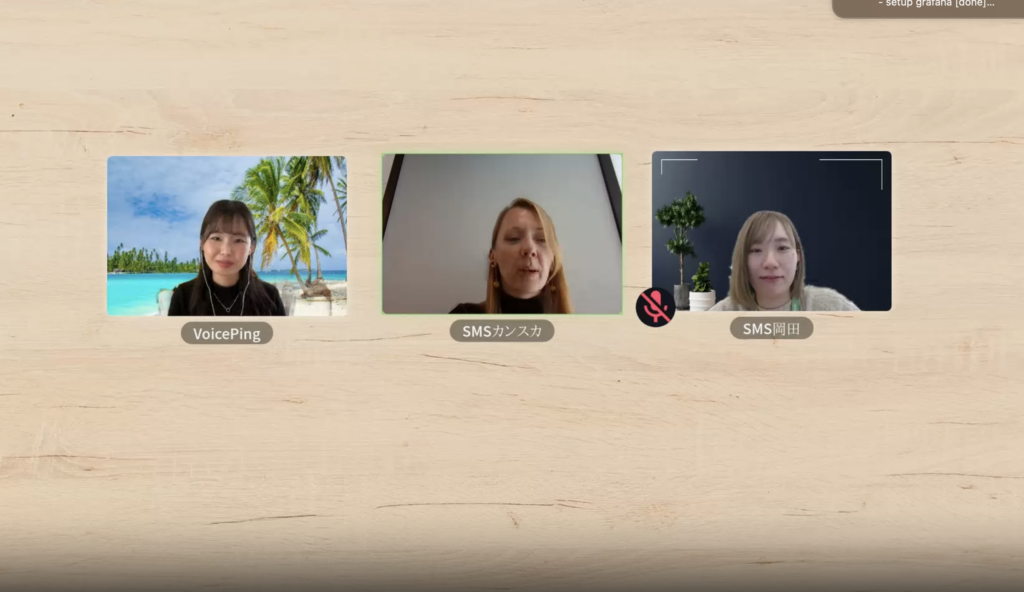
— In your view, how important is real-time translation technology for IP-driven content events like AnimeJapan?
Kansuka:
Right now, we’re only using VoicePing for the seminar programs. But during the Public Day at AnimeJapan, there are also a wide variety of stage events aimed at general fans—and some international visitors attend those as well.
These stage events typically feature voice actors giving live talks, sneak peeks of upcoming anime, and unreleased trailers, all in Japanese. Of course, there are still some technical and logistical challenges, but I believe that if we could someday extend real-time translation or interpretation to those fan-oriented programs, even more people would be able to enjoy the content.
— Based on what you’ve learned from organizing this year’s AnimeJapan, is there anything you’d like to pursue or improve for future events or projects?
Okada:
Personally, I still find communicating in English to be quite challenging.
Especially during the Business Days, but also during the Public Days, there are many visitors and buyers from overseas. Experiencing the event firsthand this time, I was once again reminded of just how critical multilingual support will be as we continue to attract more international attention.
I had always recognized the need for it, but being on-site really reinforced for me that multilingual accessibility is an essential element for the future of events.
As Kansuka mentioned earlier, I strongly feel that creating an environment where general attendees can enjoy the event in English and other languages will become increasingly important.
Currently, if a visitor from overseas asks an event staff member for assistance, the staff can often only respond in Japanese.
It may still sound like a dream, but looking ahead, I hope we can build an environment where visitors from abroad can enjoy Japanese events freely and comfortably, without any language barriers.
Kansuka:
Exactly as Okada mentioned.
In recent years, we’ve seen a significant increase in inbound tourists visiting Japan, and that’s something we can strongly feel at event venues as well.
Especially with anime culture, there are fans all over the world, and many people come to Japan with the dream of experiencing it firsthand, in its birthplace.
I believe this number will only continue to grow in the future.
We operate a variety of events, and many of them are related to pop culture.
In spaces where people who love Japanese content gather, creating an environment where they can fully enjoy the experience without facing language barriers is incredibly meaningful.
I believe it will become a major goal for us moving forward.
Summary
At AnimeJapan 2025, VoicePing was once again chosen as the real-time AI translation tool, helping create an inclusive environment where international attendees could fully enjoy the event without language barriers. Through our interview with Kansuka and Okada from Sony Music Solutions Inc., we gained valuable insights into how VoicePing was used on-site, the impact it had, and what the future might hold.
Key Takeaways
・With the growing number of overseas visitors, addressing the “language barrier” is more important than ever.
・VoicePing’s real-time translation played a key role in helping seminar attendees understand and engage with the content.
・Easy access via QR codes and accurate translation of technical terms and character names received high praise.
・The interview also highlighted opportunities for improvement, such as managing rewritten translations and controlling available language options.
・Looking ahead, there’s strong potential for expanding real-time translation support to Public Day events and beyond.
As events like AnimeJapan become increasingly international, multilingual support is shifting from a “nice-to-have” to a “must-have.” VoicePing is leading the way, making it possible for everyone—regardless of language—to equally enjoy and engage in the event experience.
Company Profile: Sony Music Solutions Inc.
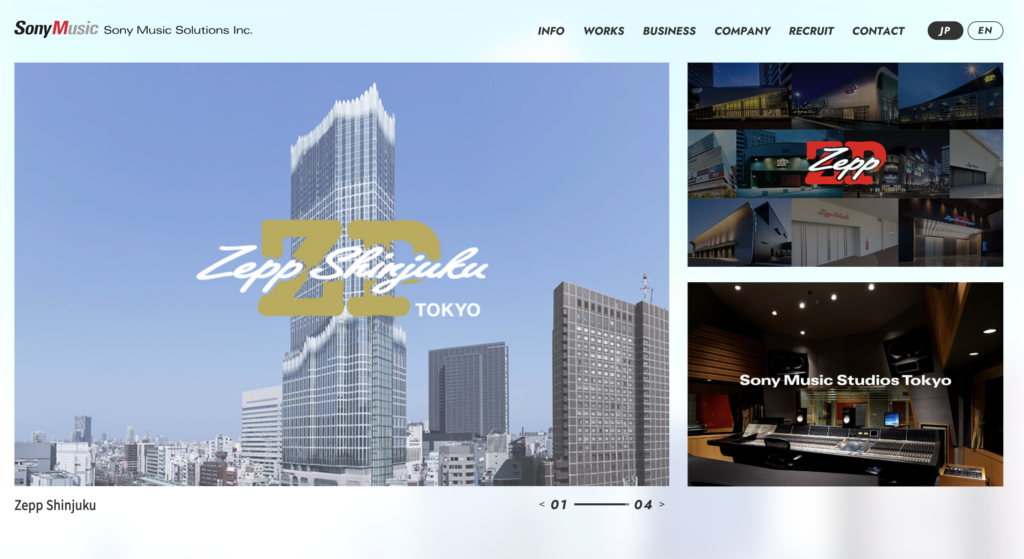
Established: August 21, 1987 (Reorganized on April 1, 2019)
Head Office: Midtown Tower, 9-7-1 Akasaka, Minato-ku, Tokyo, Japan
Business Overview:
Marketing and distribution of packaged products such as music and video software
E-commerce business
Media, content, and event planning centered around video productions
Official Website: Sony Music Solutions Inc.
Transform Your Event into a Truly Global Knowledge Festival with VoicePing
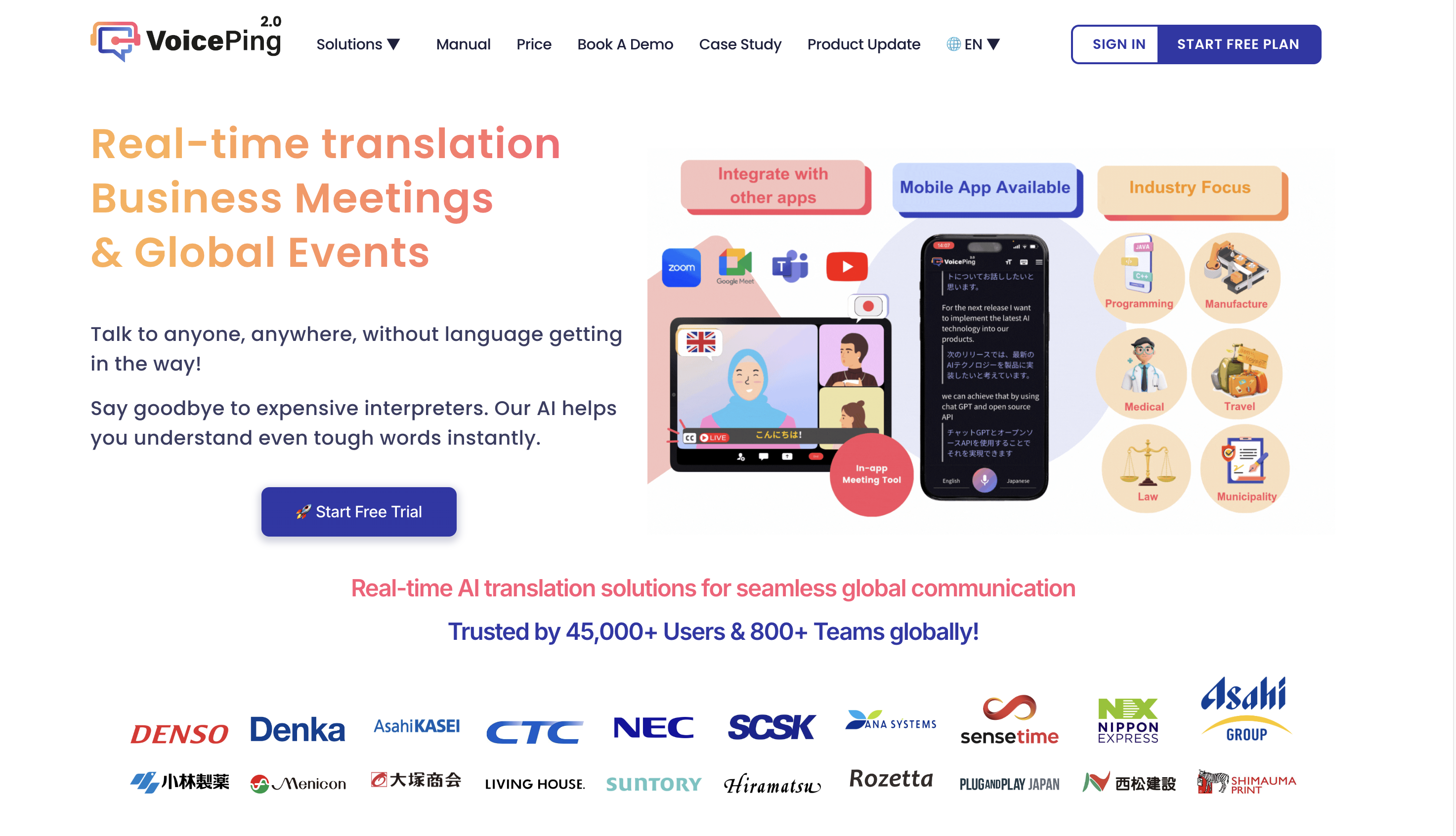
With fast and accurate real-time translation, VoicePing breaks down language barriers and creates an environment where participants from different countries and cultures can connect seamlessly.
📱 Just Scan the QR Code!
Attendees can easily view translations on their smartphones—supporting smooth communication during talks, pitches, and networking sessions.
Why Choose VoicePing for Your Event?
🌍 Make Your Content Accessible in Every Language
Let your international audience follow every session in their native language—no more missed insights due to language barriers.
⚡ Simple to Use, Powerful in Performance
With intuitive controls and high-accuracy translations, VoicePing reduces the workload for event organizers.
💡 Boost Attendee Satisfaction and Event Ratings
Enhance the overall quality of your event and earn positive feedback by supporting multilingual participation.
Ready to take your event to the next level?
VoicePing helps you create a space where knowledge truly knows no borders.
📩 Sign up for a free trial and experience the power of real-time translation.
Interested in learning more? Contact us to schedule a personalized demo session today!


